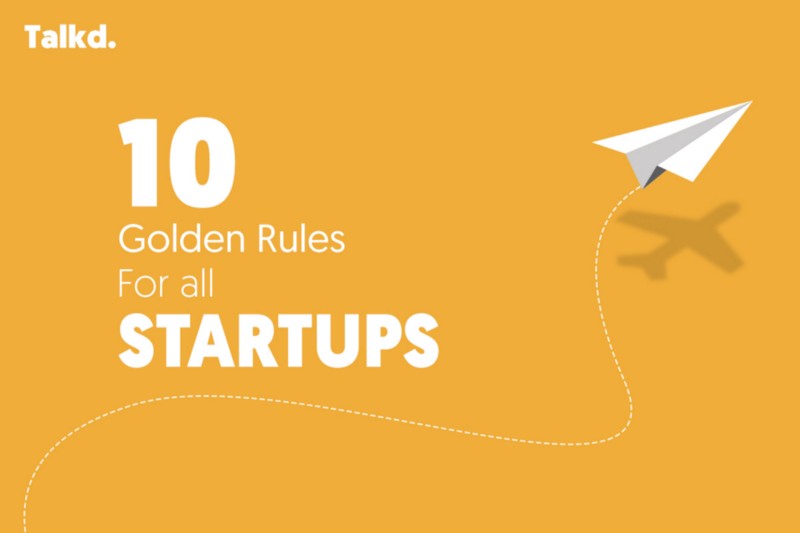
Come 16th December we are going to cross another distinct milestone — completing 8 years of our journey as an entity. Seven of which we rocked as ileadfarmers until last year when we transformed to become Talkd. Approaching our foundation anniversary, I always end up remembering our startup days. The following golden rules helped us during our first year of operation. Years have passed, and times have changed but the rules still hold. If you are commencing your startup journey, this is a must-read.
Freebies in sales — A recipe for blunder:
Giving away freebies for sampling works when you are in the FMCG business. Otherwise, selling for FREE is the surest way to business failure. Not selling from day one is bad. Selling for free to penetrate the market, from day one, is simply undesirable. You lose revenue and gain askew figures of mid and long-term sales projections.
References are aces — Keep them handy:
Your startup boat is sure to have a rocky ride during its first year, yet it won’t be the toughest of times. Starting up, spirits are high and so is the confidence. You and your team should leverage this to crack sales which are hard to get, instead of depending on contacts and references. Your best references are like your aces. You should save them when times get rough. Don’t take the easy road on day one. I promise it will get rough later and put your startup in jeopardy.
Don’t brand your startup a startup:
You know you’re a startup, the world knows you are a startup, but you don’t need to proudly brand yourself as one. It hurts your credibility. Your approach indicates that you are available, desperate, and ready to bend without negotiations. It’s not a good sign. The market is brimming with sharks ready to exploit a startup. You flaunt yourself as one and you are sure to be trapped with them in a partnership. Don’t hide that you are a startup but don’t flaunt it either.
Quality is an attitude — Incorporate it:
Quality matters, especially when you are a startup. Compromising quality and using the excuse of being a startup will only harm your credibility. Stress quality right from your first project, and incorporate it as an attitude — it will have a lasting impression on your business, even when you have crossed the startup phase.
The learning curve — Your startup comfort zone:
Learning never ends. True. But the mindset — ‘I’m still learning’ should. As a startup, you start your journey on a learning curve but fail to get out of it. The ‘learning’ phase never ends and rarely brings any positive output. Come out of this comfort zone and put insights into action. Leverage the first few things you have learned as a startup. Put them into practice and bring results.
Best friend — Doesn’t mean best business partner:
In a partner hunt for your startup, it becomes difficult to select one and people usually end up selecting their best friend or like-minded individuals. It’s a big blunder if both partners think alike and/or are experts in the same domain. In the startup leadership — opposites complement each other. When it comes to disputes, contradictions, a differences of opinion, you need someone to show you a mirror to prevent a rash decision.
Cheap doesn’t equal cost saved:
Working in a startup means you need a highly motivated team who are talented to an extent. Yet funds are hard to come by and you are strained when it comes to signing the paycheck. You settle for cheap resources, mostly freshers, believing that you will train them and eventually they will catch up. Unfortunately, you end up hiring people with no skills and talent when compromising on cost. It’s easy to say that you should look for quality resources but getting one on a lower pay scale is hard. Nevertheless, it’s an effort you have to make. Find innovative means to evaluate and hire the right person with the right intelligence and passion and ready to deliver even on a low salary.
It’s the US for us — The geographical obsession:
Startups tend to think globally forgetting that a big deal might be available right in the city. Sure, a few dollar worth of business isn’t bad but being obsessed with the USA market isn’t the right mindset. It’s not about the market, it is about where your opportunities are. Break the geographical obsession. Know your opportunities, and identify and evaluate your market accordingly. Don’t run where business booms for everyone, go to the market you are meant for.
I’ll sell the saleable — The “Do-it-all” problem:
You know your product/service and the problem it solves better than anyone plus you are short on budget. At this juncture, you think that you will close the deals for your startup. It’s the wrong approach. You should have a committed sales team and a sales strategy in place right from day one. The worst thing to do is think that you will hire a sales team later meanwhile you will do it all — from leading the startup to managing projects and sales too. It’s a big ‘No No’.
Sales guy from a big org — A big sales blunder:
You hire a sales rep from a major organization who is an ace of the team, closing big deals. Guess what? A few months later you are surprised that he fails to deliver. Selling at a startup isn’t a walk in the park. You need an individual who is experienced to deliver in a similar business environment as yours. Not some sales guy who brings a fat paycheck thanks to the capable support team he has at his current workplace. Pick someone who is experienced to run the show at a startup level.



